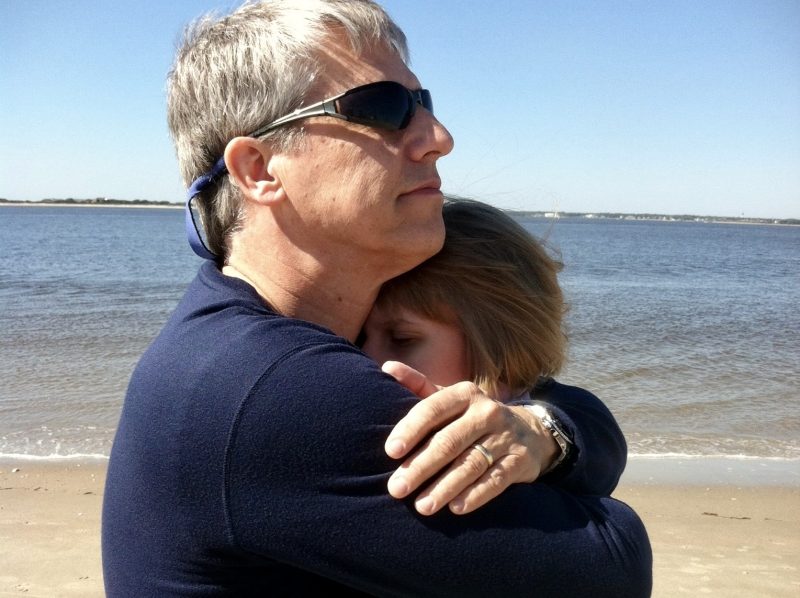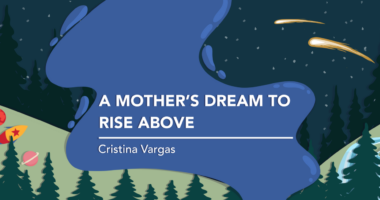A Father’s Ceaseless Stages of Loss After His Daughter’s Death

I recently stumbled across a LinkedIn post by Joe Monaco, a business development manager at Motorola. But Joe’s words, which garnered more than 206,000 likes and 3,100 shares in just two days, had nothing to do with his day job. Instead, they accompanied a photo of two of his three children standing by the tiny coffin of their sibling, Emmett, who had lost his life to Krabbe disease. And on this Father’s Day weekend, I couldn’t help but think about my own dad.
While markedly different from Krabbe, Batten disease is also eerily similar. Both are rare diseases, affecting less than 200,000 people in the United States. Both can lead to feeding difficulties, vision loss, seizures, and more. Both are inherited, caused by genetic variants in one of the estimated 30,000 genes in the human genome. Both are fatal.
When a geneticist diagnosed my baby sister, Taylor, with CLN1 disease (Batten disease) in 2006, the news almost killed Dad. Even in the last years of Taylor’s life, when our father carried her from her wheelchair to her hospital bed or sorted the many pills that gave her some semblance of quality (if not quantity) of life, I believe he never fully accepted the reality of her illness.
Indeed, during one hospitalization for uncontrollable seizures — as I wrote in the epilogue of my 2018 memoir, “Run to the Light” — “Mom and Dad suffered on their own separate islands, one resigned to making her comfortable, the other determined to keep her alive. I watched and waited and kept my own feelings locked inside.”
It wasn’t stubbornness or oblivion that hampered Dad’s connection to reality. When it came to Batten disease and Taylor, I think it was just his way of coping with the truth. He loved his youngest daughter so much that to envision her end might end him. And while Mom attacked Batten like a bulldog, Dad retreated into his own broken soul. Part of him never returned: Today, almost four years after my sister’s untimely end, he’s still mired in mourning, having never quite made it through the traditional stages of loss.
On the other hand, my mom, Sharon King, boarded a plane and flew cross-country to California for the Global Genes Summit the day after Taylor’s memorial service. To process the loss of her daughter, she hopped right back in the ring for a 13th round with Batten disease. In fact, she’s still in the fight today as a patient advocacy professional and president of our still active public charity, Taylor’s Tale.
There is no set timetable for grief. Indeed, as the mother of a healthy 3-year-old son, I don’t understand how my parents survived Batten disease. Which brings me back to Joe Monaco’s eloquent LinkedIn post. In it, he offered some of what he learned from his son Emmett’s life and death. I encourage you to follow the link and read it from beginning to end, but here, I’ll leave you with the high-level takeaways, summarized from Joe’s post:
- Tell your kids you love them.
- Be patient with them.
- Meet them where they are.
Happy Father’s Day, Dad. The rare disease community may not know you as well as they know Mom (and everyone knows her). But you’re still the best dad Taylor, Stephen, and I could have asked for.

Taylor with her dad, Jim King. (Courtesy of Laura King Edwards)
Note: Batten Disease News is strictly a news and information website about the disease. It does not provide medical advice, diagnosis, or treatment. This content is not intended to be a substitute for professional medical advice, diagnosis, or treatment. Always seek the advice of your physician or other qualified health provider with any questions you may have regarding a medical condition. Never disregard professional medical advice or delay in seeking it because of something you have read on this website. The opinions expressed in this column are not those of Batten Disease News or its parent company, Bionews, and are intended to spark discussion about issues pertaining to Batten disease.







Leave a comment
Fill in the required fields to post. Your email address will not be published.